Cylinder mowers vs rotary mowers: how to find the right fit for your needs
Selecting the right type of mower for your needs is critical to deliver a professional looking finish and ensure the long-term health of your turf. One of the most important choices in this context is deciding between a cylinder and a rotary mower – both available as walk-behind and ride-on options.
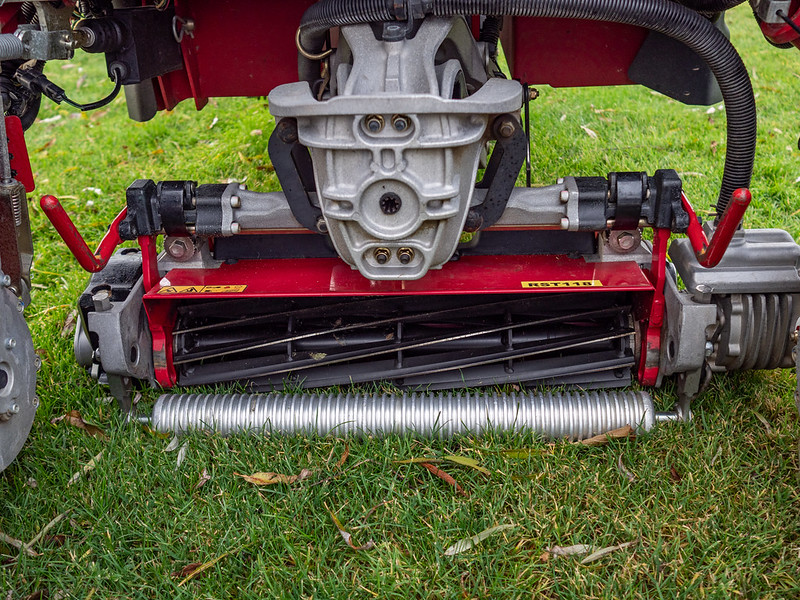
Traditionally, cylinder mowers have been the obvious choice when it comes to close, precise cuts while rotary mowers provide more versatility across a wide range of conditions, for instance when mowing longer grass. However, with technology advancements improving the performance of both types year after year, is this distinction still relevant?
In this guide, we’ll break down how these mower types work, their benefits and features and how they compare across criteria such as cut quality, performance and broader maintenance needs.
How do cylinder mowers work?
Cylinder mowers, also known as reel mowers in the US market, operate using a reel of helical blades that rotate against a fixed bottom blade. Inspired by machines used in old weaving mills to accurately trim cloth, this clever design creates a precise scissor-like cut to deliver a consistent, manicured finish in fine turf applications.
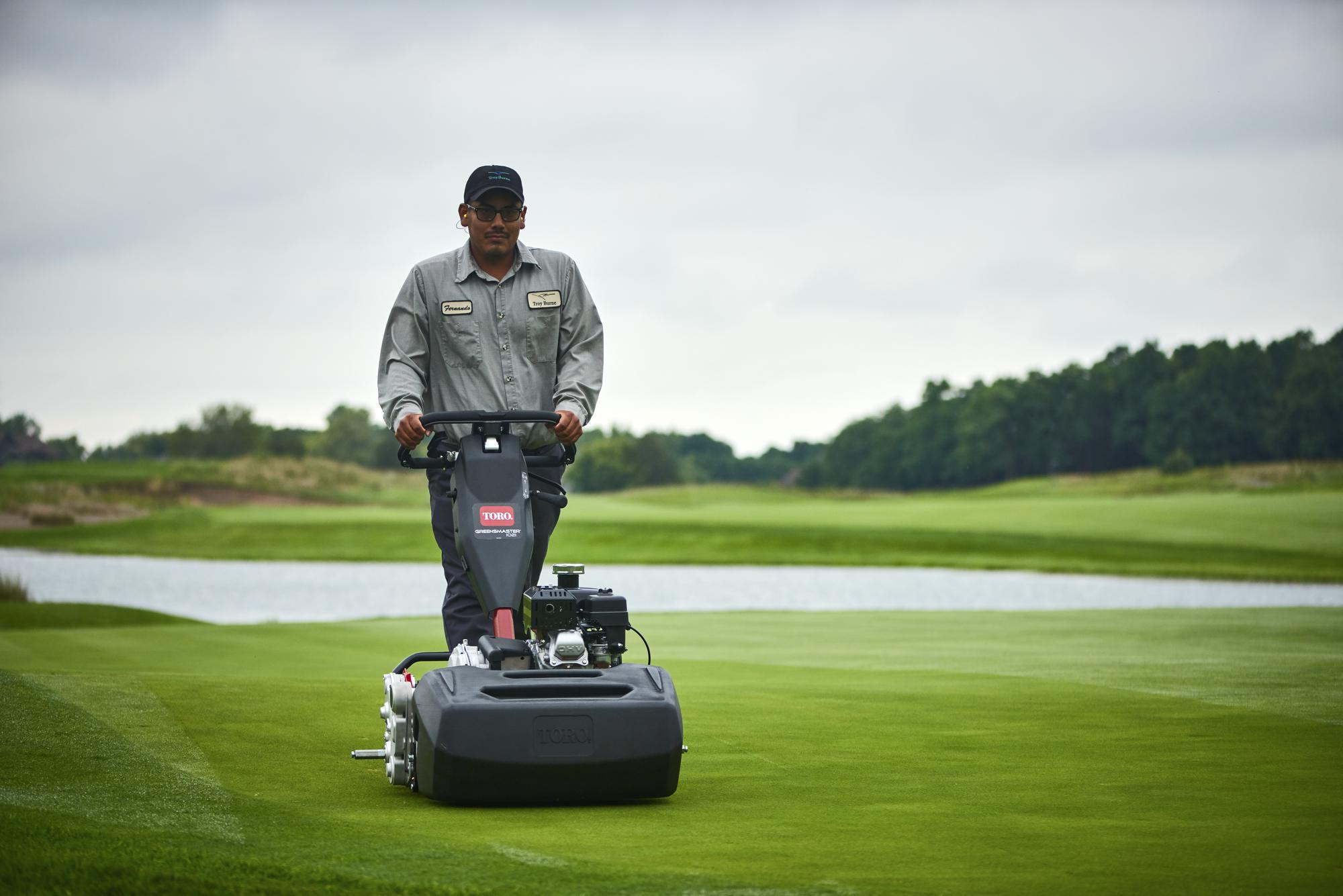
That’s why cylinder mowers are often the default choice for sports turf, golf greens or fairways and ornamental lawns, where aesthetics and grass health are the key priorities. The clean cut resulting from the scissor-like action of these mowers is very gentle on the grass, minimising turf damage and promoting a quick recovery.
What about rotary mowers?
Rotary mowers use a horizontally spinning blade that cuts grass on contact. Due to this chopping action, these mowers are generally more robust than their cylinder counterparts and can handle a wider range of turf types and conditions – including long, coarse or wet grass.
For areas such as parklands, golf roughs, schools and open sports fields, rotary mowers offer a practical and versatile option. They can also be easier and cheaper to maintain, having fewer moving parts and, overall, a simpler design.
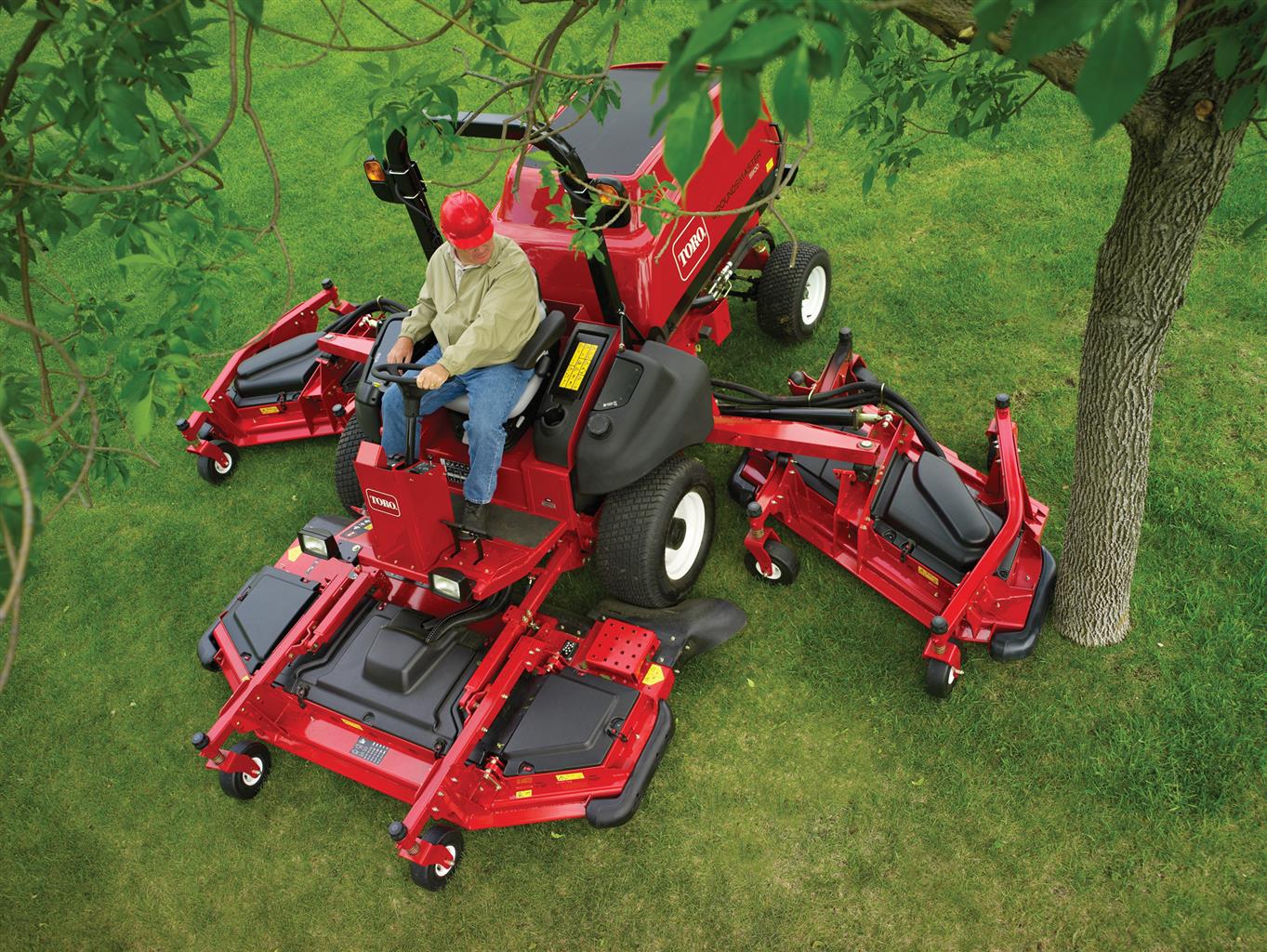
While they may not deliver the ultra-clean cut of a cylinder mower, modern commercial models ensure a high standard of performance and an excellent balance of durability and productivity.
Key considerations for your mower selection
Not sure whether a cylinder or a rotary mower would better suit your needs? Let’s see how these different mowers compare in key turfcare areas.
1. Cutting height and finish
Cylinder mowers are well known to provide the shortest and most consistent cut heights in turfcare, making them ideal for achieving a flawless, manicured finish for golf, cricket or tennis. The height of cut (HOC) of Toro’s walk-behind greens mowers, for example, varies between 1.5mm and 30mm.
Rotary mowers, by contrast, are more suitable for medium to high cut heights: the HOC range of the Toro Groundsmaster 3300 for instance is 25–152mm, a stark difference. The strength of these machines lies in their versatility, accommodating a variety of conditions while still producing a clean, even result.
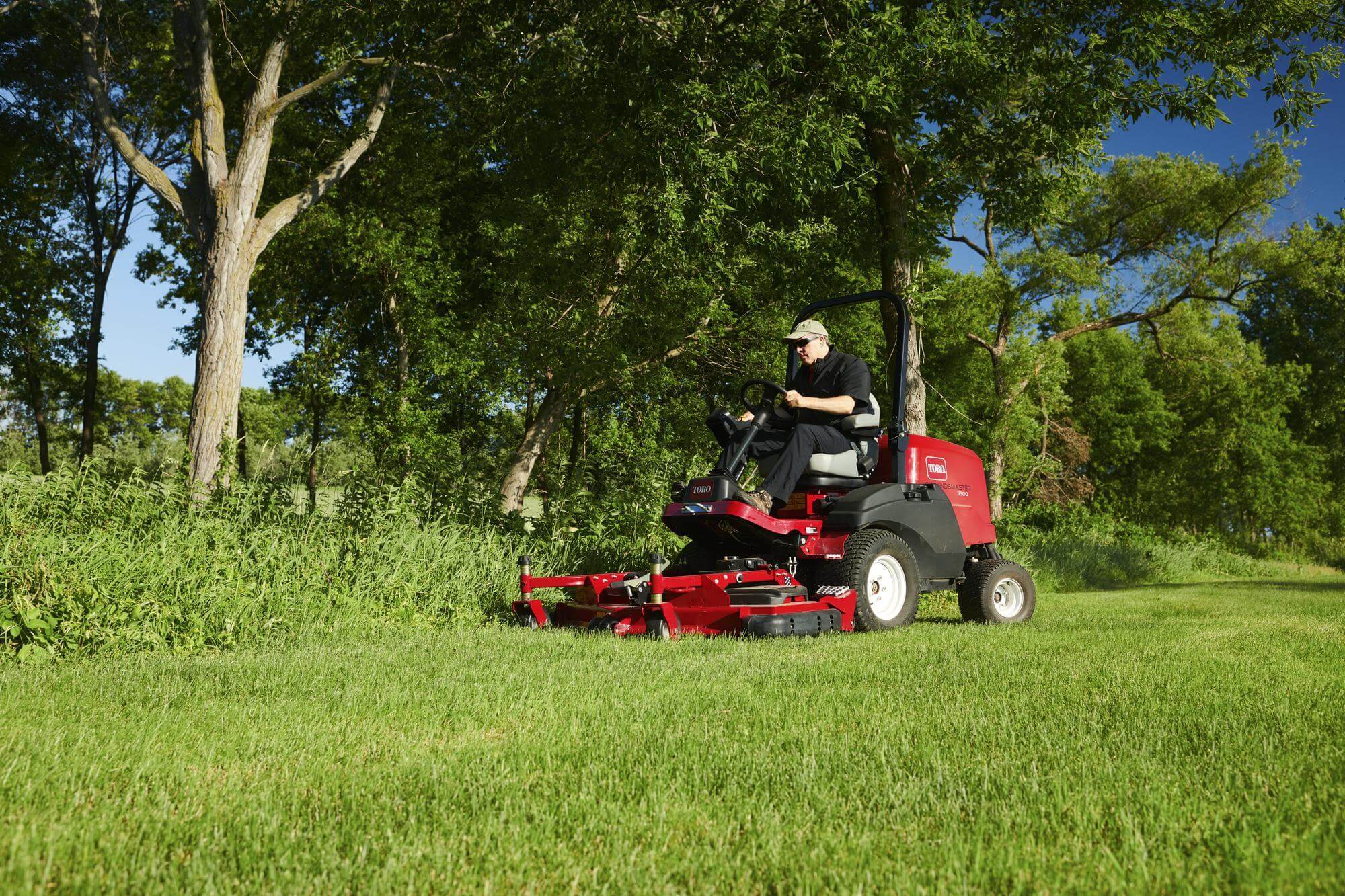
Cylinder mowers are also the most common choice to obtain the crisp, striping finish that is highly sought after on golf courses and sports pitches, as these machines can often be equipped with both a front and rear roller to better distribute weight on the turf and minimise wheel marks. Rotary mowers, however, are not automatically excluded: models like the Toro ProStripe 560 are also equipped with a rear roller and specifically designed to create beautiful stripes.
2. Size and topography of the mowing area
The size and shape of the mowing site are other key differentiators: in general, cylinder mowers perform best on flat terrain and unobstructed areas where consistent blade contact with the turf can be maintained. Because of their lower mowing rate – a result of the precise but less forgiving reel and bedknife mechanism – cylinder mowers are particularly effective in small to medium-sized spaces that require a high level of detail.
For larger, undulating or irregular spaces, the cutting deck of rotary mowers provides more flexibility. Their ability to tolerate uneven ground and varying grass lengths makes them ideal for expansive fields, roughs and sloped surfaces. They also have a higher mowing rate due to their simpler, high-speed blade design and broader cutting widths.
Additionally, rotary mowers offer easier manoeuvrability and better control when navigating through dense or tall grass patches. The reel blade design of cylinder mowers, on the other hand, may struggle in such conditions – with thick or overgrown turf potentially causing blockages that may lead to delays and additional maintenance.
3. Ease of use
When it comes to ride-on cylinder mowers, operator expertise often plays a greater role than with rotary counterparts. Navigating obstacles and managing the lifting and lowering of individual cutting units, in fact, can be a technically demanding task.
To help overcome these difficulties, Reesink offers comprehensive training on the safe and effective use of ride-on machines, ensuring that even when using cylinder mowers operators can perform to the high standards expected on more challenging terrains.

However, it’s also worth noticing that, with recent design innovations, the gap in ease of use between mower types is gradually narrowing – making high performance more accessible, regardless of the machine you choose.
4. Maintenance requirements
The need for regular maintenance is another key operational consideration. Cylinder mowers require more frequent servicing, including regular blade sharpening and precise alignment to maintain cut quality. The sophisticated cylinder blade design also tends to be more sensitive to impacts with debris or uneven terrain.
The cutting decks of rotary mowers, instead, are designed with durability in mind. They can tolerate sticks, stones or uneven surfaces, and replacing blades is a fairly straightforward process. This makes them easier to maintain and potentially more cost-effective over time.
Making the right investment
We get it – selecting your ideal mower type isn’t an easy task. It involves weighing a wide range of pros and cons. Here’s a quick recap to help make that decision a little easier.
Cylinder mowers
Pros
- High quality and precision of cut, thanks to the scissor-like action of the reel and stationary bottom blade
- Ideal for striping and fine turf
- Gentler on turf, promoting healthier grass growth
- Can be used to mow more frequently due to reduced turf damage
Cons
- Need for regular maintenance
- More prone to debris damage
- Can struggle with longer or coarse grass
- Lower mowing speed
Rotary mowers
Pros
- Suitable for a wide range of conditions and grass heights
- Good quality of cut due to recent technology improvements
- Efficient cutting, tackling long, coarse and wet grass with less effort
- More resistant to debris damage due to the chopping action of the rotating blade
- Less maintenance required
- Higher mowing speed
Cons
- Lower cutting precision and quality of cut
- More stress to the turf when blades aren’t sharp
- Fewer options to achieve a striping finish
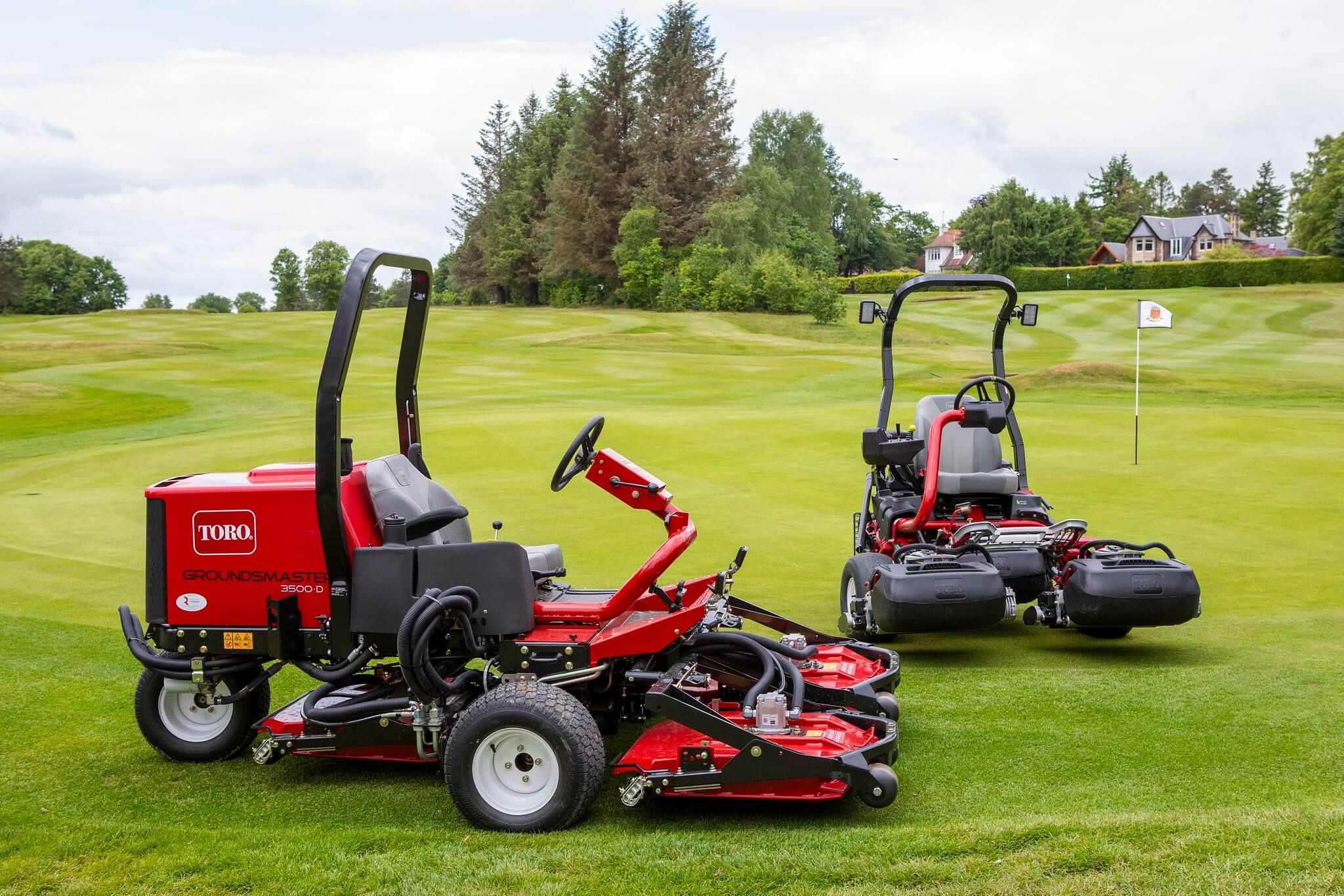
Cylinder vs rotary mowers: which is right for you?
It all depends on what the purpose is – both are invaluable for their own reasons. Yes, all things considered, rotary mowers deliver the best overall value, with more benefits and fewer drawbacks. They are the convenient choice for most mowing purposes, offering a good quality of cut and finish even when the budget may be limited.
However, cylinder mowers remain the indisputable winner if achieving a precise, flawless cut in fine turf applications is the main priority – for instance, when it comes to ensuring high standards of playability in golf.
Really, the smartest long-term investment lies in a mixed fleet. By incorporating both cylinder and rotary mowers into their equipment lineup, turf professionals can adapt to a variety of mowing needs while maintaining top-quality results where it matters most.
Your trusted turfcare partner
Just as important as choosing the right machine is partnering with the right supplier. As the UK’s exclusive distributor of Toro equipment, Reesink Turfcare offers a comprehensive range of cylinder and rotary mowers – both petrol- or battery-powered, as well as hybrid power sources.
Explore our full range of commercial mowers and discover the solution that best suits your needs at www.reesinkturfcare.co.uk, or receive expert advice from our product specialists by calling 01480 226800.